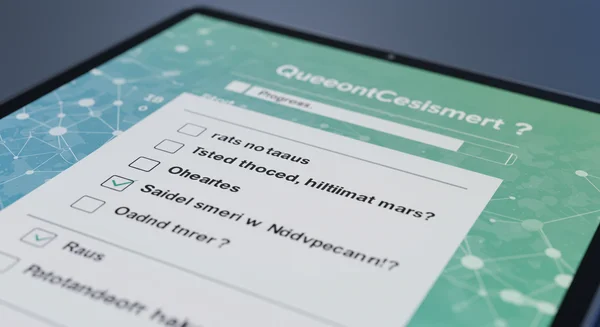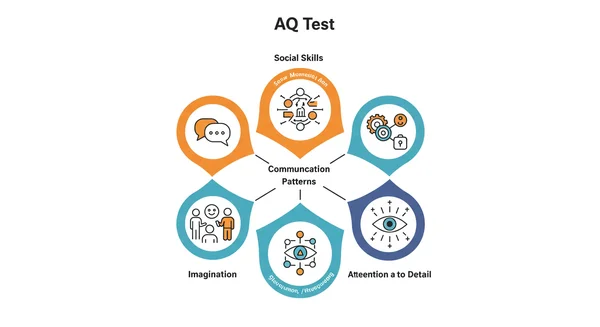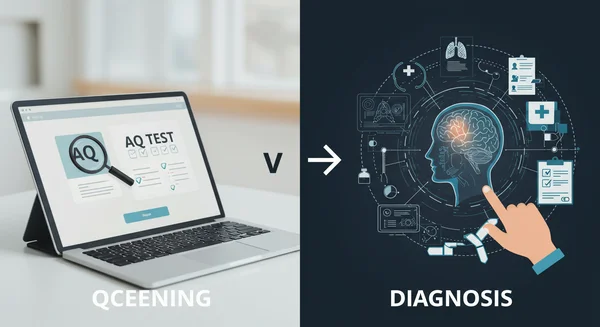What's an Average AQ Score? AQ Test Results & Interpretation
September 15, 2025 | By Eliza Finch
Staring at your AQ test score, wondering what it truly means? You're not alone. Many people ask, "What's an average AQ score?" and how their result fits into the bigger picture. This article demystifies the numbers, explains what the AQ test measures, and guides you to a deeper understanding of your results beyond a simple score. We'll explore the science and purpose behind the AQ test, showing you why seeing your traits on a spectrum is far more insightful than focusing on a single number.
The journey of self-discovery often begins with a single question. If you're curious about your own traits, you can take our free AQ test and get your score instantly. This exploration isn't about labels; it's about understanding the unique way you experience the world.

Defining "Average" & "Normal" AQ Test Scores
One of the first questions people have about their AQ score is whether it's "normal." However, in the context of neurodiversity, words like "average" and "normal" can be misleading. The AQ test doesn't measure something you pass or fail. Instead, it quantifies the degree to which you possess certain traits commonly associated with the autism spectrum.
The concept of an "average" score simply refers to the statistical mean found in studies of the general population. It’s a mathematical reference point, not a judgment on your personality or abilities. Grasping this distinction is key to interpreting your results constructively.
What Does the AQ Test Measure? A Quick Overview
The AQ test is a self-assessment tool designed by Simon Baron-Cohen and his colleagues at the Cambridge Autism Research Centre. It's a 50-question survey that assesses the extent of autistic traits in adults. This is not a diagnostic tool but a screening tool that provides personal insights into your cognitive and behavioral style.
The questionnaire evaluates traits across different areas, providing a quantitative measure of where you fall on a continuum. It helps illuminate personal preferences and tendencies, offering a framework for self-reflection. If you're ready to see how these traits apply to you, start your self-discovery journey on our platform.

Understanding AQ Score Distribution: Is There a "Typical" Range?
When we talk about score distribution, we're looking at how results are spread across a population. Research has shown that scores on the AQ test follow a pattern. A large portion of the non-autistic population tends to score in the lower range (often cited as below 32), while a significant majority of autistic adults score 32 or higher.
However, these are just statistical observations. There is no universally defined "typical" or "normal" range. Many non-autistic individuals may score higher due to having some autistic traits, while some autistic people might score lower. The score is a starting point, a piece of a much larger puzzle that makes up your unique identity. The goal isn't to fit into a box but to understand your own behavioral traits.
Interpreting Your AQ Score: Beyond a Single Number
The true value of the AQ test results meaning lies not in the final number but in the nuanced picture it paints of your personality. A score is just data; the interpretation is where self-awareness begins. Focusing solely on whether your score is high or low misses the opportunity to learn about your specific strengths and challenges.
Instead of asking, "What does my score say about me?" a more empowering question is, "What can my score teach me about myself?" On our platform, we help you answer that question. Beyond a basic score, our optional AI-powered report provides a personalized analysis of your unique profile, offering insights into your strengths, challenges, and actionable advice for personal growth. You can explore your traits in depth with us.
The Five Core Areas Assessed by the AQ Test
To truly understand your score, it helps to know what it's measuring. The AQ test breaks down autistic traits into five key areas, and your total score is a composite of your responses across these domains:
- Social Skills: This area assesses your comfort and proficiency in social situations. It looks at aspects like understanding social cues or enjoying social gatherings.
- Communication Patterns: This focuses on your communication style, such as your preference for direct, literal language versus understanding subtext or "reading between the lines."
- Imagination: This domain evaluates your imaginative abilities, including interests in fiction, storytelling, or picturing things in your mind.
- Attention to Detail: This measures your tendency to focus on the fine details of a system or pattern, often at the expense of seeing the bigger picture.
- Attention Switching/Tolerance of Change: This assesses how you handle changes in routine and your ability to transition smoothly from one task to another.
Understanding how you scored across these five areas provides a much richer picture than a single number ever could.

Your AQ Score and the Autism Spectrum
The term "autism spectrum" is key. It emphasizes that these traits exist on a continuum across the entire population. An autism spectrum scoring model moves away from a binary "autistic or not" mindset and embraces the idea that everyone has a unique mix of these traits to varying degrees.
Your AQ score is a snapshot of where you might fall on this spectrum. A higher score suggests a greater presence of these traits, while a lower score suggests fewer. Neither is inherently better or worse. Recognizing this helps foster self-acceptance and a deeper appreciation for the concept of neurodiversity.
The AQ Test: A Screening Tool, Not a Diagnostic Assessment
It's important to understand the purpose and limitations of the AQ test. It is a preliminary online autism screening tool, designed to help individuals explore their own traits in a private, low-pressure environment. It is not, and should never be considered, a substitute for a professional diagnosis.
A formal clinical diagnosis is a comprehensive process conducted by a qualified healthcare professional, such as a psychologist or psychiatrist. It involves detailed interviews, behavioral observations, and often input from family members. An online test cannot replicate this in-depth evaluation. If you have significant concerns, the AQ test is a great first step to gather information before speaking with a professional.

The Role of the AQ Test in Self-Discovery & Awareness
For many adults, especially those on a path of self-exploration, the AQ test is an incredibly empowering tool. It can provide language and a framework to understand lifelong feelings of being "different." It can validate your experiences and help you recognize patterns in your behavior that you may have never understood before.
This newfound awareness is the core value. It can lead to greater self-compassion, help you identify your unique strengths (like intense focus or pattern recognition), and give you clarity on why certain situations are challenging. This journey of gaining personal insights is often life-changing, and it can start with a simple, free aq test online.
Next Steps After Your AQ Score: When to Seek Professional Support
After receiving your AQ score, you might wonder, "What now?" Your next steps depend entirely on your personal goals. If you were simply curious, the score and insights might be enough to satisfy your curiosity and enhance your self-awareness.
However, if your traits are causing you significant distress, impacting your relationships, or affecting your ability to function at work or in daily life, it may be beneficial to seek a professional diagnosis. A formal assessment can provide access to support systems, workplace accommodations, and therapeutic strategies tailored to your needs. Use your AQ test results as a conversation starter with a doctor or therapist to explore your options.
Your AQ Score: A Powerful Step Towards Self-Understanding
Ultimately, your AQ score is not a final destination but a signpost on your journey of self-understanding. It's a tool that can unlock a deeper appreciation for the way your mind works. Whether your score is high, low, or somewhere in the middle, the real takeaway is the insight it offers into your unique personality and cognitive style.
Embrace the information as a catalyst for growth. Use it to recognize your strengths, navigate your challenges, and build a life that aligns with who you truly are. If you're ready to take that first step, we invite you to discover your results on our secure and confidential platform.
Frequently Asked Questions About AQ Scores & Tests
What is a normal or average AQ score?
While there's no official "normal" score, studies have shown that most non-autistic adults score below 32 on the 50-point scale, with an average often cited around 16. Conversely, about 80% of autistic adults score 32 or higher. It's vital to remember these are statistical averages, not definitive cutoffs. Your score is best understood as an indicator of traits, not a label.
Is the AQ test a diagnosis for autism?
No, absolutely not. The AQ test is a self-assessment screening tool, not a diagnostic instrument. It can indicate the presence of autistic traits but cannot confirm an autism diagnosis. A formal diagnosis must be made by a qualified healthcare professional through a comprehensive clinical evaluation.
How accurate is the AQ test?
The AQ test is a well-researched and scientifically validated screening questionnaire. It has shown high reliability in differentiating between autistic and non-autistic adults in research settings. However, its accuracy as a screening tool for individuals can vary. It is most effective when used as intended: for self-exploration and as a potential starting point for a conversation with a professional.
What should I do after getting my AQ score?
Your next steps are personal. You can use your score for self-reflection to better understand your strengths and challenges. If your score is high and you feel it explains significant difficulties in your life, you might consider discussing the results with a doctor or mental health professional to explore the possibility of a formal assessment. Ready to find out? Get your AQ score today.
What is the difference between the AQ test and a clinical diagnosis?
The difference is significant. The AQ test is a 50-question survey you complete yourself, providing a numerical score indicating traits. A clinical diagnosis is a multi-faceted evaluation by a trained expert that includes clinical interviews, direct observation of your behavior and communication, and a detailed developmental history. The AQ test provides a clue; a clinical diagnosis provides a comprehensive and definitive conclusion.